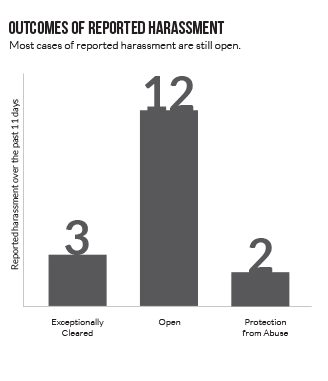
Temple Police responded to 17 counts of harassment in the past 11 days according to crime logs posted on TUPD’s website. Of the 17 incidents, 12 remain open.
Executive Director of Campus Safety Services Charlie Leone said in most cases of harassment, Temple Police get a call.
“Most times we get called, but this past week, police were in the area and we got flagged down,” he said. “Sometimes there’s a woman walking alone and there’s a man following her and he starts saying some things that made her feel uncomfortable. Area patrol was going by and stepped in.”
Leone said there most likely has not been an uptick in harassment due to anything other than the fact that people have returned to campus. He added that there is much more reporting of harassment simply because people are more informed, meaning there are more reports in general.
“It’s prevalent in that it’s a low-level crime, so reporting has become better,” he said.

Leone said harassment falls under a whole “gamut” of things — from domestic issues to shoving to saying things that cause a person alarm. He added it can also happen anywhere, including between students or people in the street.
In Pennsylvania, harassment is legally defined as hitting, kicking and shoving, following a person, communicating with lewd, threatening or obscene language or in an anonymous way or at an inconvenient time all falls under the criminal charge of harassment.
Harassment by communication, which the law states is when someone is harassed through social media, texting or by telephone, is more prevalent now because that is how most people communicate, Leone said.
He added that depending on the form of harassment the complainant was subjected to, they have the option to file a private criminal complaint through the District Attorney’s office.
“Especially if this is a relationship issue, we can get them a protection from abuse order,” Leone said. “I don’t usually see a lot of violence, but I do see persistence. A lot of it comes in the form of relationship harassment. After a breakup, one doesn’t stop calling the other or trying to talk to them even after they were asked to stop, and it can get alarming for that person.”
Two of the past 17 counts have resulted in protection from abuse orders. Three of the cases were “exceptionally cleared,” meaning students were referred to the Student Conduct Board.
Leone added that most of the time harassment stops once the harasser knows police have gotten involved.
“We always document harassment in case it doesn’t stop, and we need to file charges,” he said. “No one should be harassed. If you’re being bothered to the point where you feel alarmed, you should call. Off campus and on campus, we’ll call to follow up. There’s lots of support for you and we investigate thoroughly.”
Julie Christie can be reached at julie.christie@temple.edu.


Be the first to comment